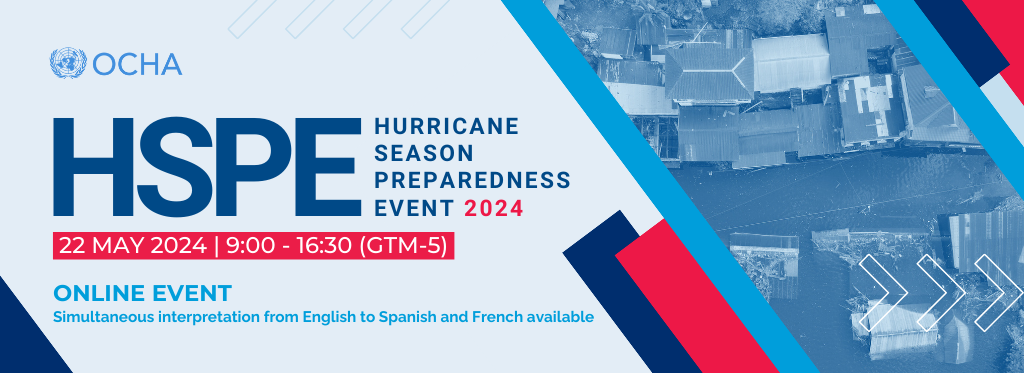2024 Hurricane Season Preparedness Event (HSPE)
2024 Hurricane Season Preparedness Event (HSPE)

Background
For four consecutive years, the Office for the Coordination of Humanitarian Affairs (OCHA) Regional Office for Latin America and the Caribbean (ROLAC) has organized the Hurricane Season Preparedness Webinar Series, complemented on 2023 with the Hurricane Season Preparedness Event (HSPE). These initiatives are designed to empower humanitarian and development actors in the Caribbean, enhancing their readiness for the annual Atlantic Hurricane Season. This year, OCHA's HSPE seeks to broaden its scope, extending its reach to encompass all countries in the Latin America and the Caribbean region. By fostering collaboration and equipping stakeholders with essential tools and knowledge, these efforts underscore the critical importance of preparedness in mitigating the impact of hurricanes across the region.
Objectives
The objectives of the event are:
- Raise awareness among humanitarian practitioners about the importance of preparedness mechanisms in mitigating the impact of disasters and emergencies.
- Enhance participants’ knowledge about preparedness through up-to-date information, tools, and best practices related to preparedness planning, risk assessment, and response strategies.
- Enhance the capacity of participants to develop and implement effective preparedness plans and strategies tailored to diverse contexts and vulnerabilities.
- Reinforce terminology, knowledge and available mechanisms related to cross cutting issues e.g. PSEAH, AAP and CMCoord.
Target Audience
The target audience for the webinar encompasses a diverse array of stakeholders engaged in humanitarian action, including representatives from United Nations (UN) agencies, non-governmental organizations (NGOs), donor community and humanitarian practitioners operating at local, national, and regional levels.
Format and Methodology
The online event will take place on 22 May 2024, from 9:00 to 16:30 hrs. EST. Sessions will not exceed 45 minutes to maintain engagement through the ZOOM platform. participants will have access to simultaneous interpretation from English to Spanish and French. The event's format includes presentations, panel discussions, and interactive workshops. This approach aims to facilitate practical learning and collaboration, equipping participants with the knowledge and skills necessary to enhance preparedness and response efforts in humanitarian action.
The event's logistics, including pre-event information, session connection links, and post-event content sharing, will be facilitated through the ReliefWeb Response platform. As the central information hub for global emergency preparedness and response, ReliefWeb Response offers a seamless and accessible experience for participants. This ensures that all relevant materials and updates are easily accessible before, during, and after the event.
For more information, comments and suggestions related to the organization of the event, you can contact Fernando Lopez (fernando.lopezr@un.org) and Martina Adinolfi (martina.adinolfi@un.org).
Sessions Overview
This virtual event will cover topics related to the 2024 Hurricane Season, including the season´s outlook and projections, international emergency response mechanisms and tools, humanitarian financing, innovative humanitarian response modalities and cross cutting issues e.g. PSEA, AAP and CMCoord. Below you may find more detailed information of the different sessions of the event.
Please click on the session titles for more information, including recordings and presentations
Session 1: Monitoring and Analysis
Time: 9:00-10:20
- 2024 Atlantic Hurricane Season-Outlook and Forecasts (IRI)
- The impact of ENSO in weather patterns in LAC (IRI)
- Anticipatory Action for Tropical Cyclones (OCHA CHD)
- International emergency response mechanisms and humanitarian architecture refresh (OCHA)
- Information management during emergency response: tools and mechanisms (OCHA)
- Food security and logistics preparedness in the Caribbean: Prepositioning and main gaps at national/regional level (WFP)
- Logistics preparedness in the Caribbean: prepositioning of NFIs from WFP/CRS and coordination with CO and partners (WFP)
Session 3: Resource Mobilization
- The Central Emergency Response Fund (CERF)
- The Start Network (Start Network)
Session 4: Cross cutting topics
- Civil Military Coordination for emergency response and preparedness in LAC (OCHA)
- GBV in Emergency response and preparedness (UNFPA)
- Gender Responsive Emergency Preparedness (UNICEF)
- AAP in emergency and preparedness (IFRC)
